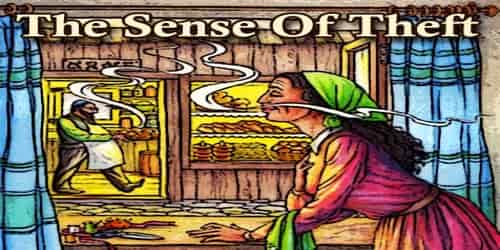Once upon a time, in a little village, a poor young woman named Zena lived opposite the baker’s shop. Everyone in the village loved Zena, for she was kind and generous. People were kind in return, but Zena remained poor. To pay for her tiny house and for her food, she cleaned people’s homes and mended their clothes.
Mordecai, the baker, baked the finest bread and cakes and pies in all the land. Everyone loved his baked goods, and all agreed he had a special touch. But he was a greedy, unpleasant man who seldom had a kind word to offer. Still, his shop was always full of folk, for no one could bake so well as he.
Zena and Mordecai seldom spoke, but Zena loved the smells that came from the shop across the street. Every morning before dawn, as Mordecai baked his bread and cakes and pies, Zena went to her window and threw it wide open. She leaned out and inhaled the mouth-watering scents that rose from Mordecai’s ovens.
“Ahh, what delicious smells,” she would sigh. “I cannot afford to buy Mordecai’s bread and cakes, but sometimes I feel full just by smelling them.”
One day Rachel and Sophie stood in the bakery waiting to purchase fresh challahs for their Sabbath meal. Suddenly Rachel began to laugh.
“What’s funny?” Mordecai asked.
“Oh,” Rachel said, “I was just thinking of poor sweet Zena. She claims she doesn’t need to eat your challah or your pies.”
“And why not?” Mordecai demanded to know.
Sophie smiled. “She feasts on the smell. So she says.”
When Mordecai heard this, he was furious. “Feasts on the smell? She’ll have to pay!” And before Rachel or Sophie could say another word, Mordecai stormed out of his shop and stamped down the road toward the courthouse.
Inside he pushed past the clerks and into the judge’s chambers. “I have a case!” he said. “I demand that you call Zena to court. She owes me money, for she’s stolen from me.” And he presented his case.
The judge listened thoughtfully. Then he sent word to Zena. “You must appear in court,” said the judge. “And you must bring all your money, for the baker charges you with theft of a smell.”
When Zena learned of her predicament, she wept. Sophie and Rachel and all the other women in the village came to comfort her. “Surely this is nonsense,” they said. “No one can steal a smell.”
“But the judge has commanded me to appear in court,” Zena said. “And he’s told me I must bring all my money.”
As people heard the tale, they began to argue among themselves. Some said that Mordecai was a greedy fool surely the judge would see that. But others whispered, “Zena has stolen. Perhaps she ought to pay.”
Soon everyone was talking about the famous case of Mordecai the baker and Zena, the woman who stole smells. Everyone awaited the judgment of the judge, for they all believed him to be wise and fair.
The day of court dawned, and Zena came carrying her bag of coins, all the money she had in the world. She appeared before the judge, who eyed her closely. “Zena,” said the judge, “tell me this. Have you been smelling the baker’s cakes and pies and bread?”
“I have,” Zena said. “In the morning I can smell all those wonderful smells. They rise up through the air and float into my window. I confess. I inhale.”
“And do those smells give you pleasure?” asked the judge.
She lowered her eyes to the ground. “They do,” she whispered.
“And have you told others you feel almost full when you smell the baker’s scents, Zena?” the judge asked.
“I have,” Zena confessed.
“And tell me, Zena,” said the judge, “what’s that in the bag you are carrying?”
“All the money I have in the world,” Zena said.
The judge was quiet then. The courtroom fell silent, too, for everyone knew the judge was thinking. He would need silence to settle this unusual case.
After several moments, the judge stood. “I have reached a verdict, Zena,” he said. “I find you guilty as charged. You are guilty of stealing the baker’s smells.”
The crowd gasped, and Zena felt a tear fall from her eye.
“And now I sentence you,” the judge continued. “Zena, please walk to the baker.”
Zena walked to Mordecai and stood before him. She blushed with shame.
“Now,” said the judge, “you will shake your bag, Zena.”
“Your honor?” she asked, for she was puzzled by this strange request.
The judge’s voice boomed. “Shake the bag, I order you,” he said.
Zena, quaking with fear, began to shake her bag. The coins inside began to rattle, and in the great, silent courthouse, the rattling echoed and filled the room with sound.
The judge looked at Mordecai. “Baker, do you hear the sound of those coins?” he asked.
“I do,” Mordecai grinned. “I do indeed.”
“And is it a lovely sound to you?” the judge asked.
“Lovely it is,” said Mordecai, imagining the feel of those coins in his hand, pleased at the thought that Zena would now pay for her crime.
“Good then,” said the judge. “Case closed. Zena has stolen a smell, and now she has repaid you with the sound of her money. All’s fair. Now, Zena, you are free to go.”
The crowd began to applaud wildly, for they had proof indeed that their judge was wise and fair.
















